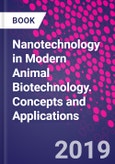Nanotechnology in Modern Animal Biotechnology: Concepts and Applications discusses the advancement of nanotechnologies in almost every field, ranging from materials science, to food, forensic, agriculture and life sciences, including biotechnology and medicine. Nanotechnology is already being harnessed to address many of the key problems in animal biotechnology, with future applications covering animal biotechnology (e.g. animal nutrition, health, disease diagnosis, and drug delivery). This book provides the tools, ideas and techniques of nanoscale principles to investigate, understand and transform biological systems.
Nanotechnology provides the ability to manipulate materials at atomic and molecular levels and also arrange atom-by-atom on a scale of ~1-100 nm to create, new materials and devices with fundamentally new functions and properties arising due to their small scale.
Please Note: This is an On Demand product, delivery may take up to 11 working days after payment has been received.
Table of Contents
1. Preface 2. Introduction 3. Nanoparticle mediated oxidative stress monitoring 4. Biosensors and Their role in Animal Biotechnology 5. Nano manipulation 6. Example of Nano biotechnology Application to Animal Biotechnology 7. Ethical issues related to use�of nanomaterials in Animal Biotechnology 8. Translational significance of Nanotechnology in Animal Biotechnology 9. Future prospects and challenges 10. Bibliography 11. Glossary








